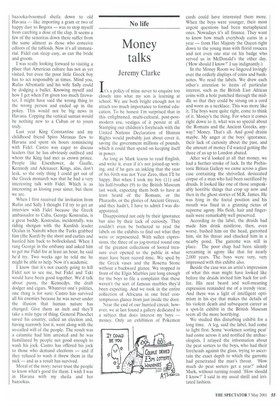No life
Money talks
Jeremy Clarke
It's a policy of mine never to enquire too closely into what my son is learning at school. We are both bright enough not to attach too much importance to formal education. To be honest I'm surprised that in this enlightened, multi-cultural, post-postmodern era, vestiges of it persist at all. Stamping our children's foreheads with the United Nations Declaration of Human Rights would probably just about cover it, saving the government millions of pounds, which it could then spend on keeping itself in power.
As long as Mark learns to read English, and write it, even if it's not joined-up writing, and if he gets an inkling that the year of his birth was not Year Zero, then I'll be happy. But when I took my boy (II) and his half-brother (9) to the British Museum last week, expecting them both to have at least heard of the Romans. or the Pharaohs, or the glories of Ancient Greece, and they hadn't, I have to admit I was disappointed.
Disappointed not only by their ignorance but also by their lack of curiosity. They couldn't even be bothered to read the labels on the exhibits to find out what they were or represented. With sullen expressions, the three of us jog-trotted round one of the greatest collections of looted treasure ever opened to the public in what must have been record time. We sped by the Greek vases and the Rosetta Stone without a backward glance. We stopped in front of the Elgin Marbles just long enough for the boys to file a complaint that these weren't the sort of famous marbles they'd been expecting. And we took in the entire collection of Africana in one brief contemptuous glance from just inside the door.
Near the end of our hurried circuit, however, we at last found a gallery dedicated to a subject that does interest my boys — money. Only an exhibition of Pokemon cards could have interested them more. When the boys were younger, their most urgent questions had been metaphysical ones. Nowadays it's all finance. They want to know how much everybody earns in a year — from Her Majesty the Queen right down to the young man with florid rosacea and not even one star on his badge who served us in McDonald's the other day. ('How should I know?' I say indignantly.) In the Money Room we lingered lovingly over the orderly displays of coins and banknotes. We read the labels. We drew each other's attention to items of particular interest, such as the British East African coins with a hole punched through the middle so that they could be strung on a cord and worn as a necklace. This was more like it. The boys were quite right, come to think of it. Money's the thing. For when it comes right down to it, what was so special about the Romans and the Ancient Greeks, anyway? Money. That's all. And good drains maybe. My anger at the boys' ignorance, their lack of curiosity about the past, and the amount of money I'd wasted getting the three of us up to London abated.
After we'd looked at all that money, we had a further stroke of luck. In the Prehistoric Britain Gallery we came across a glass case containing the shrivelled, desiccated corpse of a man who had been sacrificed by druids. It looked like one of those unspeakably horrible things that crop up now and then in the ghost stories of M.R. James. He was lying in the foetal position and his mouth was fixed in a grinning rictus of supreme agony. His flesh, hair and fingernails were remarkably well preserved.
According to the label, the druids had made him drink mistletoe, then, even worse, bashed him on the head, garrotted him, slit his throat and chucked him in a nearby pond. The garrotte was still in place. The poor chap had been silently screaming in agony like that for nearly 2,000 years. The boys were very, very impressed with this exhibit also.
Beside the case was an artist's impression of what this man might have looked like before the druids invited him back for coffee. His neat beard and well-meaning expression reminded me of a trendy vicar. And there was a light of intelligent optimism in his eye that makes the details of his violent death and subsequent career as a spot-lit exhibit in the British Museum seem all the more horrifying.
We studied this disturbing exhibit for a long time. A leg, said the label, had come to light first. Some 'workmen sorting peat' had come across it and notified the archaeologists. I relayed the information about the peat sorters to the boys, who had their foreheads against the glass, trying to ascertain the exact depth to which the garrotte had penetrated the man's throat. 'How much do peat sorters get a year?' asked Mark, without turning round. 'How should I know?' I said in my usual shrill and irritated fashion.










































































 Previous page
Previous page